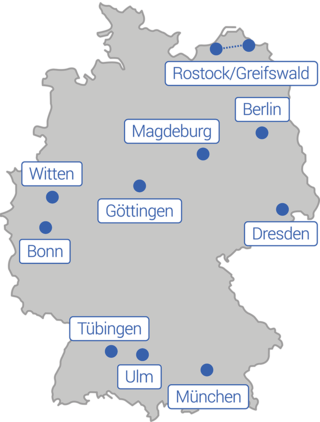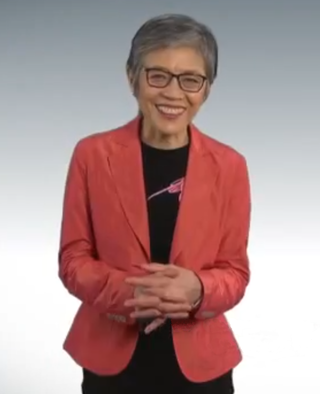Related Research Articles
Vascular dementia (VaD) is dementia caused by problems in the blood supply to the brain, resulting from a cerebrovascular disease. Restricted blood supply (ischemia) leads to cell and tissue death in the affected region, known as an infarct. The three types of vascular dementia are subcortical vascular dementia, multi-infarct dementia, and stroke related dementia. Subcortical vascular dementia is brought about by damage to the small blood vessels in the brain. Multi-infarct dementia is brought about by a series of mini-strokes where many regions have been affected. The third type is stroke related where more serious damage may result. Such damage leads to varying levels of cognitive decline. When caused by mini-strokes, the decline in cognition is gradual. When due to a stroke, the cognitive decline can be traced back to the event.
Memory disorders are the result of damage to neuroanatomical structures that hinders the storage, retention and recollection of memories. Memory disorders can be progressive, including Alzheimer's disease, or they can be immediate including disorders resulting from head injury.
The Rotterdam Study or ERGO is a prospective, population-based cohort study. The aim of the Rotterdam Study is to investigate etiology, preclinical phase, prognosis and potential intervention targets of chronic diseases in mid- and late-life. The study focuses on several diseases, such as cardiovascular, neurological, ophthalmological, hepatic, endocrine, dermatological, otolaryngological, respiratory, locomotor and psychiatric diseases.

The German Center for Neurodegenerative Diseases (German: Deutsches Zentrum für Neurodegenerative Erkrankungen, (DZNE)) is an interdisciplinary research institution that investigates neurodegenerative disease in all its facets. It is one of six "centers for health research" founded by the German Ministry of Education and Research (BMBF) to combat the most important and widespread diseases. The DZNE is part of the Helmholtz Association of German Research Centres.

Anne Buckingham Young is an American physician and neuroscientist who has made major contributions to the study of neurodegenerative diseases, with a focus on movement disorders like Huntington's disease and Parkinson's disease. Young completed her undergraduate studies at Vassar College and earned a dual MD/PhD from Johns Hopkins Medical School. She has held faculty positions at University of Michigan and Harvard University. She became the first female chief of service at Massachusetts General Hospital when she was appointed Chief of Neurology in 1991. She retired from this role and from clinical service in 2012. She is a member of many academic societies and has won numerous awards. Young is also the only person to have been president of both the international Society for Neuroscience and the American Neurological Association.
Hannah Monyer is a Romanian-born German neurobiologist and, since 1999, she has been Director of the Department of Clinical Neurology at the University Hospital in Heidelberg. In 2004 she was awarded the 1.55 million euro Gottfried Wilhelm Leibniz Prize. She received the Philip Morris Research Prize—described by Bio-pro as "one of the most prestigious science awards in Germany"—in 2006. In 2010, the European Research Council awarded her a total of 1.87 million euros for her research.
Translational neuroscience is the field of study which applies neuroscience research to translate or develop into clinical applications and novel therapies for nervous system disorders. The field encompasses areas such as deep brain stimulation, brain machine interfaces, neurorehabilitation and the development of devices for the sensory nervous system such as the use of auditory implants, retinal implants, and electronic skins.
Vijayalakshmi Ravindranath is an Indian neuroscientist. She is currently a professor at the Centre for Neuroscience, Indian Institute of Science in Bangalore. She was the founder director of the National Brain Research Centre, Gurgaon (2000-9) and founder chair of the Centre for Neuroscience at Indian Institute of Science. Her main area of interest is the study of brain related disorders including neurodegenerative diseases such as Alzheimer's and Parkinson's. She serves as the founding director of the Centre for Brain Research in Bangalore.

Virginia Man-Yee Lee is a Chinese-born American biochemist and neuroscientist who specializes in the research of Alzheimer's disease. She is the current John H. Ware 3rd Endowed Professor in Alzheimer's Research at the Department of Pathology and Laboratory Medicine, and the director of the Center for Neurodegenerative Disease Research and co-director of the Marian S. Ware Alzheimer Drug Discovery Program at the Perelman School of Medicine, University of Pennsylvania. She received the 2020 Breakthrough Prize in Life Sciences.
Albert Hofman is a Dutch clinical epidemiologist. He is currently the Stephen B. Kay Family Professor of Public Health and the chair of the Department of Epidemiology at the Harvard T.H. Chan School of Public Health.
The neuroscience of aging is the study of the changes in the nervous system that occur with ageing. Aging is associated with many changes in the central nervous system, such as mild atrophy of the cortex that is considered non-pathological. Aging is also associated with many neurological and neurodegenerative disease such as amyotrophic lateral sclerosis, dementia, mild cognitive impairment, Parkinson's disease, and Creutzfeldt–Jakob disease.
Eva-Maria Mandelkow is a German neuroscientist and Alzheimer's disease researcher at the German Center for Neurodegenerative Diseases (DZNE), Bonn.
Rebecca Gottesman is Senior Investigator and Stroke Branch Chief at the National Institute of Neurological Disorders and Stroke (NINDS) at the National Institutes of Health (NIH). Before joining NINDS, she was Professor of Neurology and Epidemiology at Johns Hopkins University. Gottesman completed a B.A. in Psychology at Columbia University (1995), an M.D. at Columbia University (2000), and a Ph.D. in Clinical Investigation at Johns Hopkins University (2007). She is a Fellow of the American Neurological Association (2012) and a Fellow of the American Heart Association (2015).

Miia K. Kivipelto is a Finnish neuroscientist and professor at the University of Eastern Finland and Karolinska Institute in Stockholm. Her research focuses on dementia and Alzheimer's disease.
Çağhan Kızıl is a Turkish/German neuroscientist and geneticist, and Associate Professor of Neurological Sciences at the Taub Institute for Research on Alzheimer's Disease and the Aging Brain at the Columbia University Vagelos College of Physicians and Surgeons Columbia University Irving Medical Center.
Mathias Jucker is a Swiss neuroscientist, Professor, and a Director at the Hertie Institute for Clinical Brain Research of the University of Tübingen. He is also a group leader at the German Center for Neurodegenerative Diseases in Tübingen. Jucker is known for his research on the basic biologic mechanisms underlying brain aging and Alzheimer’s disease.
Constantine G. Lyketsos is the Elizabeth Plank Althouse Professor in Alzheimer's Disease Research in the Department of Psychiatry and Behavioral Sciences at the Johns Hopkins University, Baltimore, Maryland, United States. He is the founding director of the Richman Family Precision Medicine Center of Excellence in Alzheimer's Disease, and an associate director of the Johns Hopkins Alzheimer's Disease Research Center (ADRC).

Yo-El Ju is the Barbara Burton and Reuben Morriss III Professor of Neurology at the Washington University School of Medicine. She co-directs the Center on Biological Rhythms and Sleep (COBRAS) and is a member of the Hope Center for Neurological Diseases at Washington University. Clinically, she sees patients at Barnes-Jewish Hospital for parasomnia, narcolepsy, restless legs syndrome, and obstructive sleep apnea. Ju's team has made multiple significant contributions to the field of sleep medicine and neurology in unveiling the complex relationship between sleep, amyloid deposition and neurodegenerative diseases such as Alzheimer's, opening new possibilities for clinical treatment. As of April 2023, the most cited work from her lab is their 2017 paper in Brain: A Journal of Neurology that showed cerebrospinal fluid (CSF) amyloid-beta protein level increases due to slow-wave sleep disruption.
Saak Victor Ovsepian is an Armenian-Irish neuroscientist best known for his research in neurobiology, neurotherapeutics and translational biosciences. He is a professor in biosciences at the University of Greenwich.
Cassandra Szoeke is an Australian medical researcher and practicing physician in internal medicine, with a sub-specialisation in neurology.
References
- ↑ Monique Maria Bernadette Breteler, Cognitive Decline in the Elderly; Epidemiologic studies on cognitive function and dementia, Dissertation, Erasmus University Rotterdam, June 1993
- 1 2 3 "Monique Breteler". Royal Netherlands Academy of Arts and Sciences. Retrieved 24 January 2016.
- ↑ "Monique M. B. Breteler". German Academy of Sciences Leopoldina. Retrieved 26 May 2021.
- ↑ "Profile of Monique Breteler at the Erasmus University". Archived from the original on 2015-04-02.
- ↑ "Population Science at DZNE".
- ↑ "DZNE Press Release about Prof. Breteler's Lifetime Achievement Award".
- ↑ "Alzheimer Association list of Lifetime Achievement Award winners".
- ↑ "Monique Breteler at Falling Walls". Archived from the original on 2016-04-21. Retrieved 2015-03-08.
- ↑ "European Commission's "The future of Europe is science" conference".
- ↑ "Monique M. B. Breteler". German Academy of Sciences Leopoldina. Retrieved 26 May 2021.